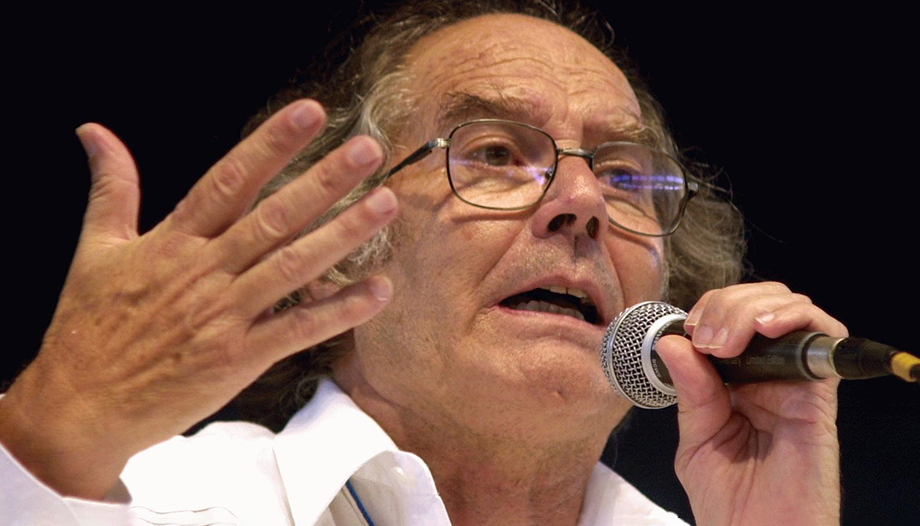On the official X -formerly Twitter- account of the 1980 Nobel Peace Prize winner, Adolfo Pérez Esquivel [@PrensaPEsquivel].the following text can be read: "Peace is the fruit of justice. Another world is possible". The account is headed by a splendid photo of Esquivel with Pope Francis at the Vatican. His signature is usually accompanied by the Franciscan motto "Peace and Good", which he learned in his childhood, among orphanages and convents, until he was sheltered in parishes that marked a course and left traces in his identity. Pérez Esquivel was orphaned when he was only three years old and, as his father Cándido, a Spanish immigrant who worked as a fisherman, could not raise him, he gave him to an asylum. He finally found a home with his grandmother Eugenia, an illiterate but wise woman of Guarani origin.
When he received the Nobel Peace Prize at a solemn ceremony at the Oslo City Hall on December 10, 1980, the Gospel beatitudes resounded in his voice: "I want to do it in the name of the peoples of Latin America, and in a very particular way of my brothers the poorest and smallest, because they are the most loved by God; in their name, my indigenous brothers, the peasants, the workers, the youth, the thousands of religious and men of good will who, renouncing their privileges, share the life and path of the poor and struggle to build a new society.". And he added: "I come from a continent that lives between anguish and hope and where my history is inscribed, I am convinced that the option of the evangelical force of nonviolence opens up as a challenge and to new and radical perspectives.".
Strong convictions
Pérez Esquivel was probably one of the few Nobel laureates who, in his acceptance speech, repeatedly evoked the name of Christ and his teachings. He closed his speech by recounting the beatitudes as they appear in the Gospel of Matthew 5, 1-12, after invoking "the strength of Christ, our Lord, as he taught us in the Sermon on the Mount and that I want to share with all of you, with my people and the world.". The moving speech can be heard today in high quality on Youtube.
His moving message was backed by a life dedicated to struggle, nourished by the incredible strength of the convictions he cherished since childhood. Defender of human rights, recognized for denouncing the crimes of the civil-military dictatorship in Argentina (1976-1983) and by extension in all America, walking alongside the suffering peoples, the peasants, the "favaleros", the marginalized and exploited, as the Church has been denouncing in Medellín (1968), in Puebla (1979) and in Amazonia (2020).
Friend of the Pope
On the fortieth anniversary of his receiving the Nobel Peace Prize, Pope Francis highlighted the "courage and simplicity". of Adolfo Perez Esquivel. In a video, Francisco spoke about Pérez Esquivel as his "friend" y "neighbor"when he traveled to Rome, "is hosted across the street from a door next door to the Vatican.". "Thank you Adolfo for your testimony, in the beautiful moments, but also in the painful moments of the homeland, for your word, for your courage and for your simplicity".The Pontiff added in his message.
Finally, the Pope pointed out: "If you allow me to use a little daring Spanish, I will tell you that you did not believe it, and that has served us all well. A Nobel Prize winner who continues to do his job with humility. Thank you, Adolfo, God bless you, and please pray for me"..
Pérez Esquivel in response to Pope Francis' message wrote: "Thank you, dear friend, for your words; you are a messenger of Peace. We pray for you." (Cfr. https://aica.org/noticia-el-papa-saludo-a-perez-esquivel-por-el-aniversario-del-nobel-de-la-paz).
Humanity and hope
In the foreword to his book Resist in hope, Perez Esquivel expresses: "I want to point out that my work is not an individual work, it is not the work of a single person. It is the struggle shared by many men and women throughout the continent and in other continents of the world. It is a struggle shared by many people who even anonymously, live in the most inhospitable places, without any resources but with a profound human wealth, offering their lives in the service of those most in need. Simply because there is hope in resistance".. Esquivel feels that it was his turn to be the visible face of so many others.
The prologue also includes a poem by Uruguayan poet Mario Benedetti: "What if I were to ask/ for you who are so far away,/ and you for me who am so far away, and both of us for/ the others who are far away and the others for/ us even though we are far away?". The answer lies in each one of us, in the ability to understand that life is about sharing hope.
In April 1977, Pérez Esquivel was arrested in Buenos Aires by the so-called "death squads". He was imprisoned and tortured for five days without any judicial process. In the torture cell, he discovered a wall on which another prisoner had written in his own blood: "God does not kill"..
For Pérez Esquivel, it is a cry of humanity. In the midst of horror and despair, faith emerges as a prayer amidst the darkness of ignominy and cruelty. An anonymous martyr, someone who left a trace of divinity in a Gethsemane devastated by human iniquity (A drop of time, p. 67).








